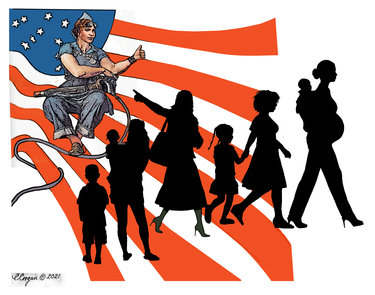The granddaughters of Rosie the Riveter are waiting to do their part
Elizabeth Whalen, Albany County’s health commissioner, has in the midst of subduing the pandemic become a symbol of competent leadership. She informs us with scientific expertise about the disease and about the vaccine that will quell it.
She speaks with compassion about the people who have suffered from COVID-19 and about the need to reach underserved communities.
Once in a while she speaks as a mother — her children are ages 16, 18, and 20. At a recent press briefing, Whalen said that, were her children younger, she would not be able to do the job she is now doing — doing we think superbly.
This is why we support the American Jobs Act. And why we believe you should too.
The act is being touted for its ability to mend our decaying infrastructure. Our Congressman, Paul Tonko, recently put out a release highlighting New York’s critical infrastructure needs. He cited a White House fact sheet that details the many miles of our deteriorating roads and bridges and billions of dollars needed to make our water systems safe.
New York received a C- grade on its Infrastructure Report Card from the American Society of Civil Engineers, facing many deficiencies that require immediate attention.
Bridges and roads are, of course, important. They connect us and keep our commerce flowing. Safe water is vital as is safe waste disposal.
So, yes, we support the American Jobs Act for those reasons.
But the infrastructure we care about more is human. We back this act with great vigor because it will start to help those who most need it in America — children and the women who raise them.
President Joe Biden got off to a good start with his American Rescue Plan that is expected to cut child poverty in half. The plan nearly doubled the child tax credit and increased benefits for childcare and for food stamps.
When the United States was founded, the economy was largely agrarian. Families — most of them headed by a male who could vote while his wife and mother could not — acted as economic units. Both women and men had roles they fulfilled.
Women fed and clothed their families while men raised crops and livestock. Children were part of farm life. Those who went to school had summers off — a schedule our public education system still follows — to work on their families’ farms.
As the country became more industrialized, there was a physical separation of where work occurred. Men went out to work at factory or office jobs and women largely stayed home. The care of children fell to women.
Often, such care wasn’t recognized as work.
With the waves of feminism in the 20th Century, many women left the home to do outside work. The need for childcare became essential.
But, while the United States government saw it had a role in providing, say, highway systems, it saw no need to provide childcare.
The pandemic has laid bare many of the discrepancies in our society that were formerly ignored. Women lost more jobs than men — many of them mothers staying home to care for kids who could no longer go to school.
Even before the pandemic, over 120 million American women lived in poverty as did 11 million children.
In the wealthiest nation in the world, this is simply wrong.
So, to return where we started, Dr. Whalen’s observation was prescient. Our society can use all of the talented, hardworking women who are currently unable to work because they need good care for their children.
If the American Jobs Plan is passed, $400 billion would be invested in childcare. Not only would this provide jobs for those running childcare programs, it would also unleash women who are now home tending to their children. They would be free to contribute to the economy.
I am myself a mother. When my children were young, I was able to work because my newspaper allowed me to bring my children to work with me.
I remember covering an event where a generator was being unveiled at the Knox firehouse and Paul Tonko, then an assemblyman, showed up for the occasion.
My daughter, Saranac, now a journalist herself, was a young child at the time. As I interviewed Tonko, she held onto my skirt and did a sort of maypole dance, walking around me one way and then back the other.
Tonko was unfazed and treated her kindly.
Before Saranac was born, before I knew who she was, safe in my womb, I worried I would not love her as much as her older sister.
The lesson I learned after she was born, and that I carry with me to this day, is that love is not finite. It turned out I didn’t have to love one child less to love the other more. Love grows.
Our economy, too, is like that. Having more workers doesn’t mean less for others. Like love, the economy grows as more people participate. It is not a zero-sum game. We make our country stronger by including others, not excluding them.
This American Jobs Plan is about more than jobs. A job, as my father used to say, is a ticket to society. This plan could be another push in the endless pushes women have made not just to give birth to equality but to have a chance to contribute all we have to offer.
— Melissa Hale-Spencer



Thankfully women are able to be in the workplace if they choose, though sadly still the wage may be less for the same work done by a male. Our world is stronger when all voices and talents are able to flourish. It will be a great day when there is equality and opportunity for all and access to childcare with well paid workers as well as access to healthcare and safe affordable birth control for everyone. Thanks!